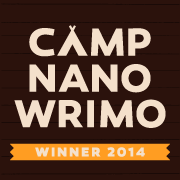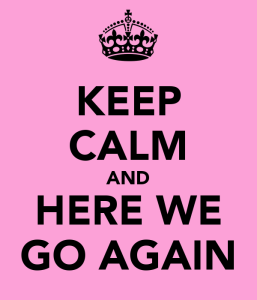Kate Larking's Blog: Anxiety Ink, page 68
May 7, 2014
Camp NaNoWriMo Victory – Lessons Learned
I officially finished Camp NaNoWriMo is epic style. Out of my goal of 40,000 words, I managed 66,319 so 166% of my goal.
I also managed to exceed the regular NaNoWriMo standard 50K.
I also managed to write more than I have ever written in a single month.

Now that my mind was finally in the first place for some iteration of NaNoWriMo, what did I learn?
I should not pants. This time around, I created a Draft Zero (which I will have an article on later) and I absolutely loved it. I felt so in control and I knew I was keeping my words. Whenever I pants, it’s like having to write seventeen drafts of the same book and then picking out the good bits to sew together–in reverse order. It was just awful. I have a 13,000 word outline to get me going and, while I’m not done, it worked well for me.
Races are weapons of mass word construction. I had word wars with over twenty different people. Some in person, some at cafes, some online, some in a word warrior chat room. I love it. Dedicating the time to race someone is a win-win, really. You get words down, they get words down.
Always encourage your pals. While my cabin and I didn’t get along great (It is not like Survivor–you do not get to vote someone out!), I had a network of people doing Camp Nano and we would all sympathize if something went awry or cheer when stars aligned.
Find a system for tracking words that works for you. I used to try and keep track of all my words on an excel spreadsheet but having that program open wasn’t conducive to my writing. Now, I have a cute agenda that I write my totals in for the day and which project I worked on for those words. It keeps me on track and I get to measure my week’s effort.
As a subset of the last one, Scrivener rocks. I finally got around to using the program intensively for a fiction project. I learned how to use the word count progress bars and I fell in love.
So now that I have finished NaNo, I have some winner goodies. However, I already have Scrivener. So I would love to give away my 50% off scrivener code to a commenter! What did you learn from your last round of NaNo? Doesn’t have to be this round. Just any round!
—-
Also, I want to wish a very happy birthday to our very own Elisa!!!!

The post Camp NaNoWriMo Victory – Lessons Learned appeared first on Anxiety Ink.
May 5, 2014
A Study In Stress
When writers write about their craft, stress tends to become a recurring theme. Have you noticed that?
Not that this site would have anything to do with stress. (And if you’re not drowning in sarcasm right now, I’m doing it wrong.)
When it comes to writing specifically, stress comes in many forms: the inner critic who tries to convince you that it’ll never be good enough, obligations you may feel toward your family to obtain/maintain a “real job”, stress that comes from giving or receiving a critique, or from letting someone read your baby for the first time . . .
Then there’s the stress of whatever day job you happen to have (and they all come with their fair share and more of stress), or the stress of unemployment, the stress of keeping your home or maybe not having one at all, or wondering how you’ll feed your kids this week (never mind next); maybe the stress of school, of getting good grades of wondering if your friends are really your friends or if they’re stabbing you in the back . . .
I’ll do us all a favor and stop listing them. Just thinking about all the various scenarios is stressing me out.
But there are also good kinds of stress! I promise!
Well, there are for me. I love the stress of a writing deadline. Writing under limitations pushes me to do more, to stretch my imagination further. Some of my best ideas come to me then.
I also love doing things that scare me. Not for the stress, how I feel before, but for the exhilaration during and after of having done it. Whatever it is, every single time has become an amazing experience.
Which kind of leads me to my whole point: everyone reacts to stress — and to different kinds of stress — differently.
Good-for-me stress makes me thrive. Bad stress tends to keep me from writing, which makes me even more stressed, so I write even less . . . see where this is going?
Some of us lash out at the world around us. I tend to turn it inward. Bad stress pushes my self-destruct button. Bad stress most often leads directly to depression.
And it’s this sneaky, evil thing that wriggles and worms around so you don’t know what, precisely, is wrong. I’ve gotten better at identifying it in myself. In the aftermath of my dad’s death, noticing it before it grew too bad became a survival skill.
When I’m bad-stressed, I make lists. Lists help me feel in control and make everything a little less overwhelming. I try to unplug or at least avoid excess screen-time. If I need an escape, I have plenty of books awaiting reading. And books don’t encourage the downward spiral like endless time-wasting in front of a screen.
Most of all, I write. If story-writing seems beyond me, then I free-write — usually an attempt at stream-of-conscious. If nothing else, that sort of writing tends to help me figure out what is bothering me and stressing me out.
Does any of this sound familiar to you? Do you have any sources of good-stress? What are some of your (helpful and healthful) coping mechanisms of bad-stress? And if you’re feeling really brave: what is something you would like to change about your reactions to stress?
The post A Study In Stress appeared first on Anxiety Ink.
May 1, 2014
The End of Camp NaNoWriMo: A Partial Success in 2014
I managed to “win” my camp challenge, but not technically. I have to qualify because I feel like I didn’t win by my personal NaNo standards. With NaNo I like to make goals that I hit with completely new words of fiction. That means I don’t count outlines, notes, or editing. I’m kind of a masochist.
I wasn’t able to work to my standards this April, for reasons I’ve mentioned in previous posts. But I tried really hard! And I’m solidly pretending that I didn’t go on and on about socializing and networking with other writers when I outlined my challenge because I completely hermited this April. I have the pasty skin to prove it. And I think five people knew I was participating…I tell you, that accountability thing with all the people in your life really spurs you on.
If I’m only counting new story words, I ended up writing 3458 words out of the 10K I wanted to hit. Or 35%.
If I count all the outlining, researching/planning I needed to do, in total I wrote 4725. Or 47%.
Then there’s that story I spent nearly every free day I had this month editing. I wish I had a numerical value for the amount of work I actually did with that piece. Seriously, I’d have hit 50k and then some since I tore it apart and put it back together over 11 drafts. However, counting that baby in, I ended my challenge with roughly 12 978 words.
12 978 / 10 000 words. 130% done!
130% is none too shabby. Even though I wish things had been a little different this month so that I could truly throw myself into the revelry of camp. Oh well. Still, a major positive came out of camp for me: I finally got my butt in gear and started conceptualizing a series I’m really excited about. It got me writing again, and not just when I “had time.” I found myself squeezing in little writing windows throughout the week because I just wanted to get back to my story. And I have a big picture plan for it! That really excites me because I needed a project like this to focus on right now after putting a different one on the back burner (again).
Overall, this was an important experience to show me where I’m at in my writing life and what I can tackle with my current life schedule. I’m thankful for the eye opening experience –one I’m trying not to see as a fail!
How did everyone else fair with Camp NaNoWriMo?
The post The End of Camp NaNoWriMo: A Partial Success in 2014 appeared first on Anxiety Ink.
April 30, 2014
Writing Subtext: A Weakness
The more I write, the more I understand what my weaknesses are as a person as well as a writer. And I can pretty much tell everyone that, hands down, subtext is my weakness.
In life, I miss nuances in conversations and actions. I offend people. I’m brash at times and too quiet in others. I put a lot of pressure on myself to always have an answer, even if that answer isn’t very thought out.
As a result, I find it difficult to present my characters motivations through writing subtext instead of directly telling them.
My first drafts, especially when speed drafting, tend to rely on telling, rather than showing. Or stating the obvious and then reaffirming the obvious with character thoughts as well. Doubles the word count, but not with real quality words.

I go through my didactic writing in revisions, removing obvious statements and replacing with removed actions to clearly connote what a character is thinking.
It has taken me years to realize that it’s not about the first draft. You can’t expect perfection to come from your fingertips all the time. If you do that, you’re in for a world of hurt. If you have to address the weaknesses in your writing later and layer in the effect you want, there is nothing wrong with that. In fact, it makes you better to know where you need to pay special attention. The only issue is that you can’t rewrite a statement in real life (wouldn’t that be helpful?).
What are your writing weaknesses?
The post Writing Subtext: A Weakness appeared first on Anxiety Ink.
April 28, 2014
Ode To A Day Off
My weekend feels wasted, creativity-wise.
Don’t get me wrong: it was a good couple of days. Saturday, I went to the baby shower for one of my best friends, and I wrote quite a bit (for me). Sunday, I helped my grandmother move and wrote significantly less.
It’s not that I didn’t do anything creative, but I didn’t do what needed doing. Specifically, I have a short story to edit, due later this week. And I just don’t have the brain to be working on it now.
This frustrates me to no end.
Days off are important. Back when my day job had me off as many days as I worked, that wasn’t such a big deal. Now with only two “free” days a week, I have to be extra careful about how I use them.
My weekend wasn’t even terribly packed, but I’m still exhausted and burned out. Part of that likely has to do with not knowing when I’ll have any proper time off in the next few weeks.
Make no mistake: I am totally whining in this post. Sorry.
The point is that time off is important. Vitally important. Time when the only expectations placed on you are whatever you’ve chosen to place on yourself. It’s time to recoup and regroup. If we don’t do that, we end up too strung out and burned out to accomplish the things we really want to do. Time off — whatever form that takes — is necessary, and I am currently feeling the strain of not having it.
But I need to figure out a way around that in the next day or two in order to meet this deadline. I may have to go internet-silent. (I’ve been doing that a lot lately, and it’s wonderful.) One way or another, I will find a way to get this story done. It would just be nice to have it done already, instead of scrambling until the last minute.
This is why I guard my time so selfishly that sometimes months will pass without me seeing and spending time with people I love. It’s the part I hate most about working a full-time day job.
Which perhaps makes it a bit ridiculous that I auditioned the other day for a summer production of Shakespeare’s Julius Caesar. Maybe I’m a touch masochistic.
Do you have any strategies for when you’ve overreached yourself? Please share! I need all the help I can get.
The post Ode To A Day Off appeared first on Anxiety Ink.
April 24, 2014
Speed Writing
As I write this nifty post, I’m (still) in the middle of a self-publishing book Kate talked me into buying. Made me buy? Nagged me to buy? Told me to buy? Anyway, I’m done part one, and that’s important here because that part made me want to gouge out my own eyeballs so I didn’t have to read anymore. Seriously. But I’m done that part! And now I want to talk about a section that has left me mulling as I continue reading.
The authors of this book, the title of which I’m keeping secret right now purely for my own amusement, posit that writers should write their first draft as fast as they can. They say you should “vomit” your words onto the page and just get a draft down to work with. Since we’re in the middle of a NaNo season and I’m seeing check-ins from writers speed writing –and having done it myself –I highlighted this vomit idea in the book.
[For the record, this is not the first time I’ve heard the vomit idea, but it’s the most recent, so I’m going to stick with quoting these authors.]
The authors even said they time their writing periods and basically train themselves to write faster, like one would train themselves to run faster/harder/better. They’re all about efficiency. I time myself when I write but I don’t know if I do it for that reason. I time my writing so that I force myself to stop and stretch because otherwise I’ll be walking around with a gimpy back and neck –been there, done that for too long and it isn’t fun. I do just restart the timer if I’m in a really good part and I don’t want to stop the creative flow yet.
But I also time my sprints because I’m competitive and I like to push myself. So I guess I do what train. During school when I was writing papers and stories all the time for classes I could pump out 500 words in 10 minutes. In November 2013, after not writing for a long time, I had to up my time to 15 minutes to break that 500 cap. This month, after having been focused on editing since November, I had to up my time to 20 minutes to get anywhere near 500. I cringed when I didn’t even break 400 words after 15 minutes during my first sprint. I knew what my problem was immediately, though: I was overthinking every sentence. I was trying to get my story out RIGHT instead of just getting it out.
Still, I’m on the fence about this vomit metaphor. I get that you want to get your story out before you lose it and you want it to be organic. Actually, the authors of the book say repeatedly that going as fast as you can allows you to hit a better state of creativity because your speed essentially drowns out the critic. I think that’s an awesome point. But, I’ve also just spent that past five months editing one of my vomit pieces. FIVE. MONTHS. Thankfully, I’ve only started getting tired of it this month. I’m just so ready to move on to my next project!
But we’re talking about vomiting here and I need to focus. My current story was nearly 10K after I finished it during NaNo. The editor I’m giving it to by May 1st said she wanted no more than 7.5k. Cue the dramatic music. I have spent the past five months culling and shaping and questioning this story because I needed to kill 3 thousand of my precious word babies. I’m damn near there, though, I’ve got that sucker down to 7779 words. That was HARD.
I suppose if I was writing a book without such tight constraints vomiting words wouldn’t be such a big deal during the editing phase. Unless you’re an “under-writer,” meaning you always write less than the minimum words you’re given, I wouldn’t recommend vomiting the first draft of a short story.
I want opinions on this because I have a feeling I’m going to talk myself in circles. Are you pro-vomit? Anti-vomit? Ambivalent about word vomit? Let me know!
Fine, the book is called Write. Publish. Repeat. I know you wanted to know.
The post Speed Writing appeared first on Anxiety Ink.
April 23, 2014
Where do you get your ideas?
Where do you get your ideas? A dreaded question for most writers because, really, the ideas come from everywhere and anywhere.

Where do you get your ideas from?
I regularly go through the spam comments here at Anxiety Ink and what I end up seeing is hilarious. Sometimes, there is the entire form content posted with the multiple choices. Other times, there are really odd mashups with keywords put together so your eye snags on a word and this, “Maybe not spam?” because it is ultimately confirmed by the discount, Ray Ban sales link.
In this post, I want to detail a few of my outstanding favourites from the spam filter that have led to some great story ideas for me.
“Destiny Lemon” – this was a username that someone had registered with us and I fell in love with it. It promises a really ridiculous romp with lots of comedy. Because, remember, when life gives you lemons, they should at least be freakin’ Destiny Lemons!
“Gemstone blueprint” – A quote from a spam filter comment that really got the epic fantasy wheels turning in my head. Doesn’t that sound super neat? I can only imagine how the world might end if the entire gemstone blueprint was assembled (…by the Destiny Lemon). Also mentioned? Gem directories.
“Establishment threads” – while I’m sure it was referring to comment threads (maybe, it was a mess of a comment), I prefer to imagine corporations connected via thread magic. I like the idea of the corporate world bound up in something traditionally considered feminine—threads and sewing.
“Pretty ornate sleep rooms…cause we can relax there and give the relax to our corpuses, which it certainly deserves.” – Other than offering a free lesson in why thesauruses can’t be blindly depended upon (changing body to corpse can really change the tone of a piece), I imagine a room decorated in an overly ornate and intricate way that it’s difficult to sleep…and it might kill you.
What’s the wackiest place you have found ideas?
The post Where do you get your ideas? appeared first on Anxiety Ink.
April 21, 2014
On Rewrites
I have decided that rewriting a novel is like meeting old friends for the first time in years. I’m re-learning them, rediscovering what I love about them, and unearthing those things that have changed.
It certainly makes the writing easier when I’m not still trying to figure out how they each act, react, and interact.
Who knew a rewrite could be fun?
It’s something I’ve always wanted to do, yet dreaded at the same time. I know how long a rough draft takes me, and how much work I still have to do at the end. Why would I want to put myself through that more often than I had to? Especially with so many other stories to get to, I just never allowed myself the time.
But now I’m doing it. I’ve invested too much in this story. I love it too much not to.
I originally started writing it more than five years ago. My knowledge of the craft and of basic story structure has grown exponentially since then. Now, I’m better able to make it the story it was always trying to be.
On the other hand, a rewrite is not a rough draft. Not unless I want to spend another three years on this same novel. For efficiency’s sake, I don’t have the luxury of thinking that I’ll fix all the problems later. I no longer have the excuse of not knowing the world, characters, or plot.
It’s strange having a blazed trail to follow. In many ways easier — the words seem to flow across the page, though because I’m still in the early stages, I have no way to tell if this trend will continue for another twenty chapters.
For now, this rewrite — the whole process of rewriting — is new, and exciting, and fun. I’ll let you know if I still find it all that by the end.
Wish me luck!
The post On Rewrites appeared first on Anxiety Ink.
April 17, 2014
Past the Middle Mark Camp Check-In
I remember in November I was so stoked about riding the accountability train. I had that shit down during NaNoWriMo. Everyone knew I was participating. Everyone knew my goal was that 50k word count. Everyone knew which days I did or did not write because I posted my day’s count almost everywhere. I owned November.
The same cannot be said for Camp NaNo. Not by a long shot.
I’m slightly disappointed that I’m not further along 18 days into the challenge, but my conditions are 180 degrees different now in April than they were five months ago. For one, I can’t just sit at my computer four afternoons a week and write my heart out. I am no longer unemployed with the freedom to do what I want, when I want. Man, I miss that. Two, my free time is bloody limited and I’m resentful that the majority of it is spent in front of a computer. Come on, a large part of my day job has me in front of a computer. Who can blame me? Three, I have a really important deadline for the end of the month and fine-tuning my story for that deadline is more important to me than Camp.
Writing is a labour of love. Underline labour.
Still, it is love, and I’ve made headway this week. I spontaneously, in a way, got Tuesday off and decided to take a break from editing and get some words down. I needed the break anyway since there’s a glaring part of my story I’m having difficulty fixing. That in itself is driving me slightly nutty. As it is, I have just under a thousand words I need to cut from said story before I can hand it. No pressure.
Anyway, I did pretty well on my day of writing. After realizing I had deleted the only words I’d written for Camp, aside from my outline, I started over. Shit happens. Those roughly 200 words had been hard to get on the page, it was like pulling teeth, and it showed. The new story intro works much better and it flowed so that I could keep moving instead of look at my blinking cursor. I got over 2000 words written and would have been ready for more if dinner-time hadn’t arrived. AND I figured out character names.
See? I can see a glass as half full! Go me.
I don’t know if I’ll hit or surpass my 10k goal at this point, but I’m writing and I’m getting an important story done. That’s good enough for me.
Here’s where I’m at just past the mid-point of Camp:
2920 / 10000 words. 29% done!
The post Past the Middle Mark Camp Check-In appeared first on Anxiety Ink.
April 16, 2014
Developing Characters – Character Grids
Characters are not my inherent thing. I am a plot person. You give me a character facing a choice and I can make a whole plot. But when it comes to subplot and relationships between characters? I need framework and assistance.
In my recent draft for Camp NaNoWriMo, I saw across from a friend and tried to explain to her what I was doing. She kept asking me, “Why?” I had two characters who were facing off against each other and they both, deep down, wanted the same things. “Why are they fighting, then?”
Well, shit. Why were they fighting?
I spent the next hour of writing making a logic framework to describe why my characters would be in conflict with each other.
It looked a little like this (but I filled it with fictitious relationship statuses for your amusement):

Click to see full size.
In this example character grid, the left column is which character is being discussed. This is his or her perspective about the relationship with the person labelled at the top of that column.
Some of the characters thoughts were directly foiling each other, like Leoss versus Innighta. Innighta only likes him for fashion advice and, Leoss, on team with Innighta’s rival, gives her bad fashion advice. Leoss wouldn’t mind getting with Thero but Thero doesn’t pay attention to Leoss because Leoss is, alas, not a chick.
Also revealed? Thero and Innighta, basically married, really don’t like each other nor do they have a very functional relationship. But it is perceived as functional to Hotera, who wants Innighta.
While I greyed out what the characters think of themselves, if it’s important to you to have the inner conflict, it can be included.
So while the above character grid was made up in twenty minutes (and, while having my character’s name names, absolutely does not reflect my actual grid–which is over 1000 words in length and nuances).
I have found that this approach helps me a lot more than four to five page character profiles that start with the mundane things like, “Hair Colour?” and make me feel like I’m wasting time. If I give the character a hair colour, yeah, I’ll make it down, but I won’t write his whole dating profile ahead of time. This grid gives me something quick and functional to work with in order to guide my characters to their inevitable disasters–err, resolutions.
What about you? How do you develop your characters?
Camp NaNoWriMo Update!
I have smashed into my word goal for the month and have no choice but to plough through it.
[image error]


40039 / 40000
(100.1%)
The post Developing Characters – Character Grids appeared first on Anxiety Ink.
Anxiety Ink
- Kate Larking's profile
- 53 followers






